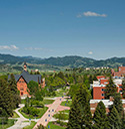Community Health
Please contact a faculty member to set up a meeting to discuss your interests and
experiences before applying to the program.
Why Study Community Health at MSU?
The Community Health program offers a skills-based graduate degree that integrates theory and critical thinking to assess and act on the needs of individuals, families, and communities. Students learn to plan, implement, and evaluate programming designed to promote health, human development, and well-being with families and communities.
As a student, you will:
a course of study with your faculty mentor that is aligned with your interests and goals. Students often combine required coursework with courses from other areas of campus including the College of Nursing, Department of Education, Department of Native American Studies, Department of Psychology, and Department of Political Science.
working directly with faculty in projects that utilize innovative approaches such as community-based participatory research and emerging qualitative and quantitative methods.
with recognized faculty in family and community health. We purposively keep our program small so that each student develops a close professional relationship with his or her faculty mentor.
skills and techniques necessary for conducting health research with individuals, families, and communities as well as learning program planning and evaluation, grant writing, and policy analysis.
your skills in working in partnership with rural or Native American communities developing, implementing, and evaluating targeted and appropriate health interventions for unique health challenges.
for the future pursuit of a doctoral degree in a family and community health-related field.
All in a beautiful environment.
For MSU’s Community Health master’s degree program, students are accepted into the program by one of our faculty members who will serve as a mentor and work closely with the student through their time at MSU. Potential applicants should investigate the websites of faculty members and contact faculty prior to submitting their application. We believe this matching process provides students with the support and structure to succeed in our program.
Faculty
Prospective students are encouraged to email the faculty below to set up a meeting to discuss your interests and experiences and how you may benefit from study at MSU.
Michelle U. Grocke, PhD, received her doctorate in Applied Medical Anthropology and her master's in Cultural Anthropology from Montana State University. Prior to completing her graduate studies, she worked for a variety of local and international non-government organizations including a microlending organization in Seattle, WA, the United Nations Population Fund and the International Labor Organization. Her research examines the socio-cultural and environmental determinants of malnutrition, food security, and subjective well-being among rural populations in Montana, Peru and Nepal Himalaya. She currently has a split position between the HHD department and MSU Extension, for which she is also the Health and Wellness specialist, working to bring evidence-based health programming to all 56 counties in Montana to reduce health disparities. She has received funding from the National Science Foundation, Montana Healthcare Foundation, Substance Abuse and Mental Health Administration and the United States Department of Agriculture.
Elizabeth Rink, PhD, MSW, received her doctorate in Public Health from Oregon State University and holds a master's degree in Social Work from the University of Washington. Dr. Rink's research examines the individual, psychological, social, cultural, and environmental determinants of sexual and reproductive health among indigenous populations in Montana and the Arctic. Dr. Rink's areas of expertise include community-based participatory research as well as qualitative and quantitative research methodologies. Her research has been funded by the US Office of Population Affairs, the National Institute of Health, and the National Science Foundation.
Mark Schure, PhD, received his doctorate in Public Health at Oregon State University’s School of Social and Behavioral Health Sciences. Upon receiving his master’s degree at Montana State University, he worked for three years at the local health department as a health promotion specialist. He has worked on several types of community-based health research programs in Montana and Oregon. Dr. Schure completed his post-doctoral training at Puget Sound Health Care System’s Health Services Research and Development division. His research expertise and interests lie in understanding health correlates of mental health issues among older adults, ways to improve access of mental health care and aging resources in rural areas, examine novel interventions to improve mental health and well-being, and reduce stigma associated with poor mental health.
The program provides students with the skills and training necessary to assume leadership positions in the following settings:
- Nonprofit organizations
- Education
- Federal, state, and local government
- Health insurance agencies
- Cooperative Extension
- Governmental public health agencies at the local, state, and national levels
- Nonprofit organizations
- Domestic and international voluntary organizations
- Health maintenance organizations
- Corporate wellness programs
- Foundations
- Schools
- Other health and human services organizations
- Academia
About the Area
There is no better place to study health than in Bozeman--a thriving mountain town, with limitless opportunity for outdoor activities, cultural activities, and a work hard-play hard mindset. In addition to providing access to an extraordinary ecosystem for teaching and research programs, Bozeman is renowned for year-round recreational and cultural opportunities including access to world-class ski areas, multiple blue ribbon trout streams and the Gallatin National Forest. The Bozeman-Yellowstone International Airport is served by several major airlines and is the busiest airport in the state.
MSU is located in Bozeman, Montana, an extended community of about 70,000 nestled in the Rocky Mountains in Southwest Montana. Named an All-American City, Bozeman boasts high-quality medical facilities, a very low crime rate, many fine restaurants, acclaimed public and private schools, a symphony orchestra and choir, an annual opera, and nationally known events such as the Sweet Pea Festival of the Arts held in early August of each year. Bozeman is listed as one of National Geographic’s “World’s 25 Best Ski Towns.” Bizjournals.com ranked Bozeman #2 on the list of American Dreamtowns–small towns that offer the best quality of life without metropolitan hassles. The K-12 educational system, reputation of Montana State University, and pristine natural environment of the area combine to make Bozeman one of America’s most desirable university towns. Bozeman is located in the beautiful Gallatin Valley, 90 miles north of Yellowstone National Park.
Admissions
Admissions decisions are based on:
- Undergraduate preparation (GPA and strength of prerequisite course work)
- Goodness of fit and how consistent interests and goals of student align with research and outreach goals of faculty (to be addressed in personal essay)
- Relevant professional experience
- Strength of letters of recommendation
Prerequisites
Prerequisites include an undergraduate degree in community health, family science,
health promotion, or related social science degree and/or course work that typically
includes introductory psychology and sociology, anatomy and physiology, statistics,
and lifespan human development.

















